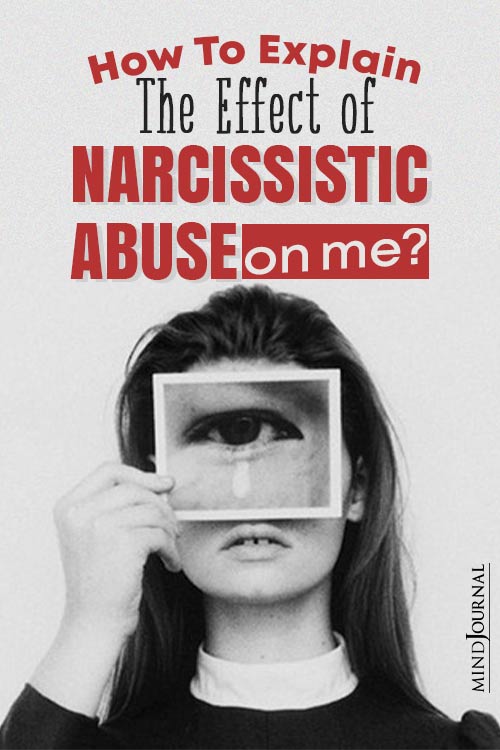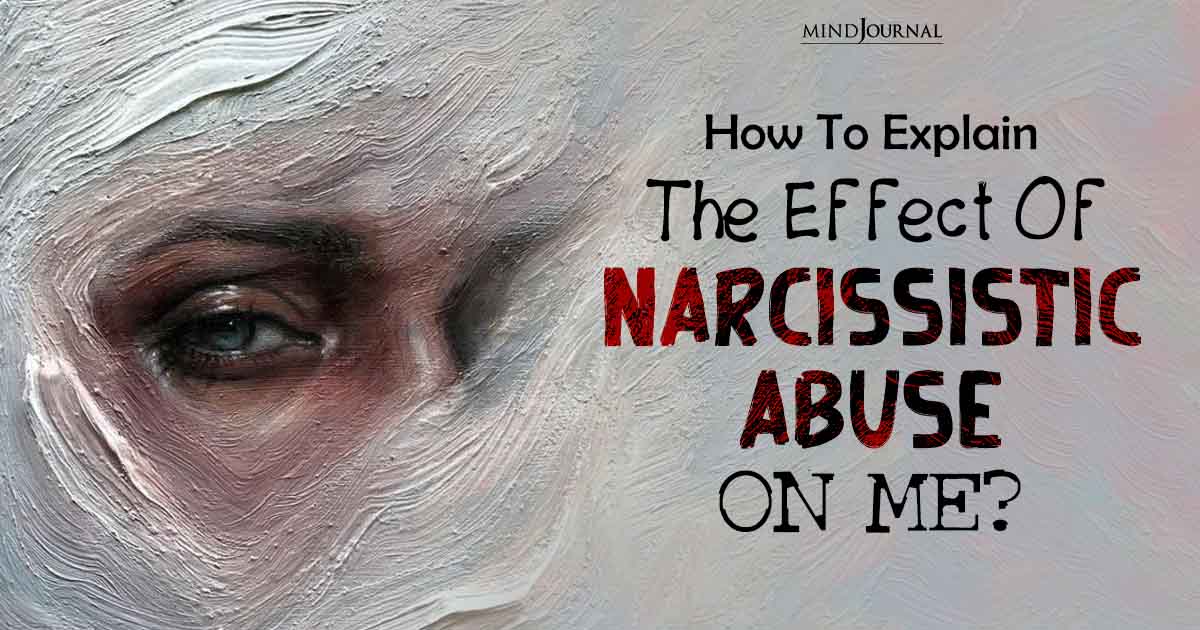Narcissistic abuse comes in many forms that’s why victims have a hard time explaining the effect of narcissistic abuse to others as narcissists, quite efficiently, make themselves look like victims. So to explain your experience, understanding narcissism is important.
Written By Dr. Elinor Greenberg
KEY POINTS
- It can be hard to explain narcissistic abuse to someone who has never experienced it.
- People will have trouble understanding why you stayed after the abuse started or how you got into that situation in the first place.
- Even though you are the victim, some people may blame you or minimize your suffering.
Many people who have suffered narcissistic abuse at the hands of a mate have a very difficult time explaining their situation to people who have never experienced anything like it. They are usually asked some form of the following questions:
- What is narcissistic abuse?
- Why did you put it up with it?
- Why did you stay in the relationship for so long?
Everyone will have his or her own version of the answers to these questions. However, it can be hard to repeatedly explain what happened and why. My clients’ dilemmas motivated me to write out for them a general explanation that they could adapt to their situation, print, and hand out to their loved ones.
Note: In this post, I am using the terms narcissist, narcissistic, and NPD as shorthand for someone who qualifies for a diagnosis of narcissistic personality disorder. I am using male pronouns in the example below, but this can be applied to all genders.
Related: Micromanipulation And 5 Signs Of Narcissistic Abuse
The General Definition of NPD: Understanding Narcissism
My partner (or ex) has a narcissistic personality disorder. This means that although he can project an image of being very confident and capable, underneath he actually feels very insecure about his self-worth.
This uncertainty makes him seek perfection, validation from other people, and high status in an effort to reassure himself that he is special and stabilize his shaky self-esteem.
People with narcissistic personality disorder lack emotional empathy. This means that my partner could not feel happy for me when I succeeded at something (unless it reflected well on him) or bad when he hurt me.
The combination of these two things—difficulty regulating his own self-esteem and having no real empathy for other people—made my partner very self-centered and preoccupied with his own needs, although he generally tried to hide this.
Instead, he did his best to project an image of whatever he thought would make him seem admirable to other people.
The Effect of Narcissistic Abuse In Relationships
All of the above made him ultra-sensitive to negative feedback, easily offended, and very aggressive towards me when he became angry. At the beginning of our relationship, he was very admiring and attentive to me. I didn’t realize it, but “getting” me after courting me made him feel strong and special.
Once we were together, that wore off. He started to pick me apart and tell me what I needed to change. He became very bossy and punished me by yelling or coldly withdrawing whenever I did not do things his way.
He also blamed me for anything that went wrong, even when it was obviously his fault. I started to be afraid of him after he threw the TV remote at my head.
Things got worse as time went on. He did not care that he was abusing me (no emotional empathy) and he wanted to hurt me because devaluing and abusing me made him feel strong and better than me, which upped his self-esteem.

In essence, our whole relationship from the beginning was all about him using me to feel better about himself. By the end of the relationship, I felt like a broken confused mess.
Back then, before I learned about narcissism, I could not understand why I was being abused by a person who claimed to love me. It took me a long time to realize that I would never be able to please him, and we would always be fighting because he was a narcissist and incapable of having a normal relationship.
Even though I now know this, it is still taking me a long time to heal because I really loved him and I believed him when he said he loved me and that we would be together forever.
Summary
It can be difficult to explain narcissistic abuse to people who have never experienced it. They are usually puzzled about how you could let this happen and not see it coming and why you stayed in the relationship after the abuse started. Some people may think that you are exaggerating.
Read: Narcissistic Abuse Syndrome: 10 Signs You’ve Experienced Narcissistic Abuse
It is especially hard to explain when your narcissistic mate can project an image to other people of being smart, calm, and caring. In the end, you may have to settle for accepting that some people will simply not be able to imagine how you suffered or how badly you were treated.
Written By Dr. Elinor Greenberg Originally Appeared On Psychology Today
Frequently Asked Questions
How to deal with a narcissistic female boss?
Understand the source of her resentment toward you, respond carefully, lay boundaries, don’t get affected by her behavior, don’t feed their ego, and never argue with her.
How to tell if your narcissistic ex wants you back?
If they are reaching out, especially on important dates, apologizing for things that are ancient history, sending you gifts, or making unrealistic promises, they might want you back.
Do narcissists get worse with each relationship?
Narcissists tend to get more bitter and defensive with age as their personality disorder intensifies. For this reason, it can be said that they get worse with each relationship.
What are some examples of a Narcissistic stare?
A creepily intense and fixed gaze, a cold death stare of anger, and a stare that shows they are scheming in their mind are some common examples of a narcissistic stare.












Leave a Reply